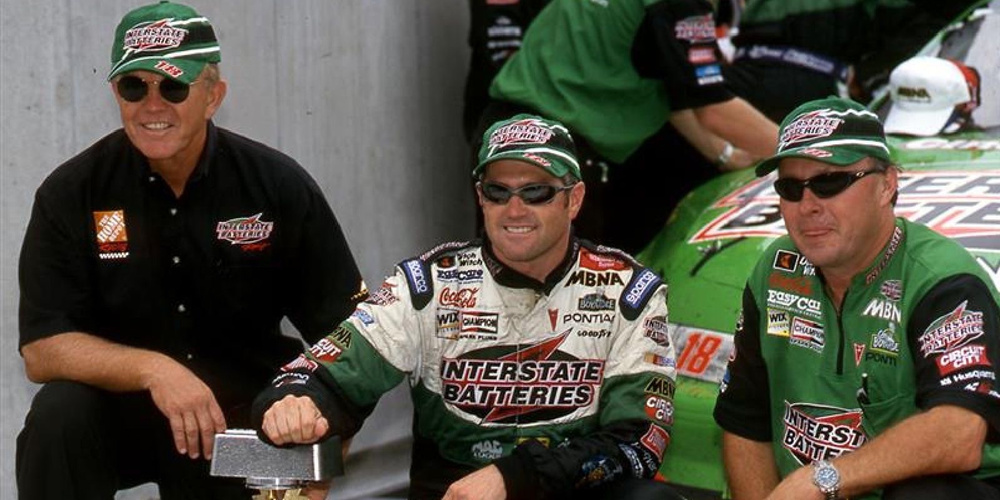Note: This continues a series of letters from NASCAR drivers recounting their Big Machine Hand Sanitizer 400 Powered by Big Machine Records wins and other big moments to happen at the Brickyard. Read other installments of "My Brickyard Moment" here.
Bobby Labonte had his best year in stock car racing in 2000, not only winning the Brickyard 400 but going forward to capture the NASCAR Cup Series championship for car owner Joe Gibbs. Labonte talks about his “golden year” of racing, which included his Brickyard triumph, which he describes as one of his best days in the sport. Here are his memories of that day, in his words:
I think winning the Brickyard 400 was definitely a top-three moment of my racing career. When you think of winning the Brickyard, I mean, to me it ranks up there in my deal as far as the championship and winning your first race. It was a huge day for me because it’s such a big event. We didn't fall into that one there. We raced pretty hard to get that win.
I knew after practice we had a really good car. I knew leading up to that race we were just a top-five contender almost every weekend that year. We had the fastest car on the long runs, while Rusty Wallace was really good on short runs. The end of the race turned out to be a long run, which worked in our favor. I knew I could beat him.
We were so good that day near the end of the race that my crew chief Jimmy Makar was on the radio hollering for me to “slow down, slow down” because he wanted me to save the equipment.
I had to back up a little bit to make sure we didn’t take the lead by too much. We finished that race second two years in a row, so it was like one of those things where we were close, but never could get there. I remember most of what happened that day and all the major stuff that went on throughout the race.
Indianapolis, you get a victory there, and it sticks with you longer than maybe some other places that you go to, because it’s not just a trophy, a slap on the back, good job and we’ll see you next time.
It seemed like every year I went back, they were honoring past race winners one way or another. It is one of those places that you go to that where they remind you that you won a race there.
The top teams run well at Indy each season, the teams that get a lot of championship points. Everybody puts out a special effort for Indy. They build a new car, or do this and that. Chances are you are not going to have a guy 25th in points come out of nowhere to win the Brickyard.
The driver who wins those type races, like Indianapolis, is going to win or contend for the championship, because they’re running good and winning races.
In 2000, we were a championship team at Gibbs Racing. The year before we missed it by a few points and finished second. In 2000, no mistakes were made by anyone. We really geared up to win it because of what we did in 1999.
We had gone to a two-car team in 1999, adding Tony Stewart and the No. 20 car, and Joe Gibbs was still involved in the day-to-day operation of the race team. He had not gone back to football at that point.
Going from a single-car team to multi-car team was definitely a plus. We were trying to stay ahead of the curve. We had got behind, then excelled when we got Tony.
I don’t think Joe Gibbs gets enough credit for his concept of the multi-car team, where everybody works on the race cars at the shop. Everybody wore the same color shirt at the shop, and people might work on the No. 18 car one day and the No. 20 the next.
The same people put the same stuff together on both cars. It didn’t matter which car, because both cars got the same stuff. Joe Gibbs was big on that. I think that was a real key to our success, like us winning the Brickyard 400 in 2000.
I needed no time to have that race win sink in. I knew that was huge. I usually don't get too extremely excited in Victory Lane, but when you see photos from the 2000 Brickyard, you can find pictures of me standing on the car, and that is not like me, not my style.
We didn’t win with track position or pit road strategy. It was, get that last set of tires then race, race, race. To win like that was a whole a lot more gratifying than if we had won on fuel mileage, not that that’s bad, it’s just more gratifying to win straight up.
We had a really good team that year. It was the kind of year where if we didn’t finish top five, or win, we were disappointed with our effort. To win that year, well, we were definitely dead on target that year to win races and win the championship. It was just one of those years, you know, a golden year.




